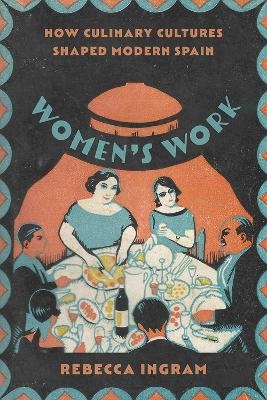
Women's Work
How Culinary Cultures Shaped Modern Spain
Seiten
2022
Vanderbilt University Press (Verlag)
978-0-8265-0489-0 (ISBN)
Vanderbilt University Press (Verlag)
978-0-8265-0489-0 (ISBN)
Even with global attention, we know little about how Spanish cooking became a litmus test for demonstrating Spain’s modernity and, in relation, the roles ascribed to the modern Spanish women responsible for daily cooking. This book places these efforts in their historical context.
We are living a moment in which famous chefs, Michelin stars, culinary techniques, and gastronomical accolades attract moneyed tourists to Spain from all over the world. This has prompted the Spanish government to declare its cuisine as part of Spanish patrimony.
Yet even with this widespread global attention, we know little about how Spanish cooking became a litmus test for demonstrating Spain’s modernity and, in relation, the roles ascribed to the modern Spanish women responsible for daily cooking. Efforts to articulate a new, modern Spain infiltrated writing in multiple genres and media. Women’s Work places these efforts in their historical context to yield a better understanding of the roles of food within an inherently uneven modernization process. Further, the book reveals the paradoxical messages women have navigated, even in texts about a daily practice that shaped their domestic and work lives. This argument is significant because of the degree to which domestic activities, including cooking, occupied women’s daily lives, even while issues like their fitness as citizens and participation in the public sphere were hotly debated. At the same time, progressive intellectuals from diverse backgrounds began to invoke Spanish cooking and eating as one measure of Spanish modernity.
Women’s Work shows how culinary writing engaged these debates and reached women at the site of much of their daily labor—the kitchen—and, in this way, shaped their thinking about their roles in modernizing Spain.
We are living a moment in which famous chefs, Michelin stars, culinary techniques, and gastronomical accolades attract moneyed tourists to Spain from all over the world. This has prompted the Spanish government to declare its cuisine as part of Spanish patrimony.
Yet even with this widespread global attention, we know little about how Spanish cooking became a litmus test for demonstrating Spain’s modernity and, in relation, the roles ascribed to the modern Spanish women responsible for daily cooking. Efforts to articulate a new, modern Spain infiltrated writing in multiple genres and media. Women’s Work places these efforts in their historical context to yield a better understanding of the roles of food within an inherently uneven modernization process. Further, the book reveals the paradoxical messages women have navigated, even in texts about a daily practice that shaped their domestic and work lives. This argument is significant because of the degree to which domestic activities, including cooking, occupied women’s daily lives, even while issues like their fitness as citizens and participation in the public sphere were hotly debated. At the same time, progressive intellectuals from diverse backgrounds began to invoke Spanish cooking and eating as one measure of Spanish modernity.
Women’s Work shows how culinary writing engaged these debates and reached women at the site of much of their daily labor—the kitchen—and, in this way, shaped their thinking about their roles in modernizing Spain.
Rebecca Ingram is a professor of Spanish at the University of San Diego.
Acknowledgments
Introduction
1. Emilia Pardo BazÁn: Culinary Nationalist and Ambivalent Feminist
2. Frivolous and Feminist: Carmen de Burgos’s Culinary-Political Platform
3. Mythologies of Culinary Modernity: Gregorio MaraÑÓn and Nicolasa Pradera
4. Cooking and Civic Virtue: Women, Work, and Barcelona
Conclusion: Feminist Food Studies and Spain
Bibliography
Index
| Erscheinungsdatum | 29.09.2022 |
|---|---|
| Zusatzinfo | 7 b&w images |
| Verlagsort | Tennessee |
| Sprache | englisch |
| Maße | 152 x 228 mm |
| Gewicht | 142 g |
| Themenwelt | Sachbuch/Ratgeber ► Essen / Trinken |
| Geisteswissenschaften ► Geschichte ► Regional- / Ländergeschichte | |
| Geisteswissenschaften ► Sprach- / Literaturwissenschaft ► Anglistik / Amerikanistik | |
| Geisteswissenschaften ► Sprach- / Literaturwissenschaft ► Literaturwissenschaft | |
| Sozialwissenschaften ► Soziologie ► Gender Studies | |
| ISBN-10 | 0-8265-0489-2 / 0826504892 |
| ISBN-13 | 978-0-8265-0489-0 / 9780826504890 |
| Zustand | Neuware |
| Haben Sie eine Frage zum Produkt? |
Mehr entdecken
aus dem Bereich
aus dem Bereich
Erinnerungen
Buch | Softcover (2024)
Pantheon (Verlag)
CHF 22,40


